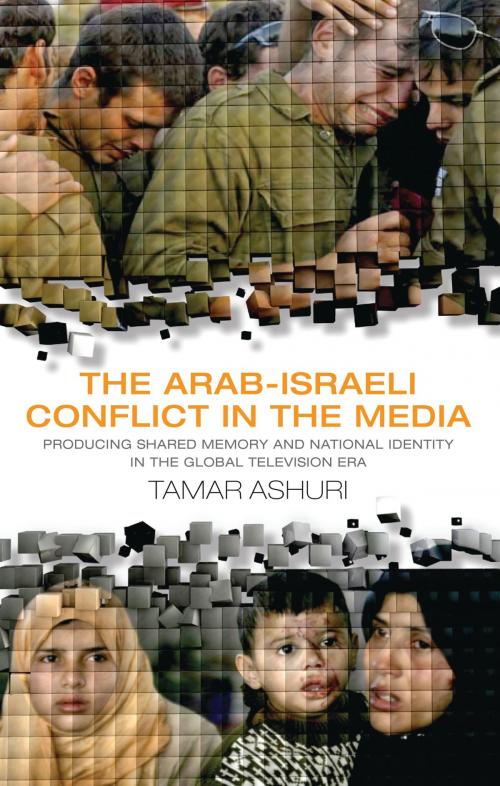The Arab-Israeli Conflict in the Media
Producing Shared Memory and National Identity in the Global Television Era
Nonfiction, Social & Cultural Studies, Social Science, Cultural Studies, Popular Culture, Political Science, History| Author: | Tamar Ashuri | ISBN: | 9780857730664 |
| Publisher: | Bloomsbury Publishing | Publication: | October 30, 2010 |
| Imprint: | I.B. Tauris | Language: | English |
| Author: | Tamar Ashuri |
| ISBN: | 9780857730664 |
| Publisher: | Bloomsbury Publishing |
| Publication: | October 30, 2010 |
| Imprint: | I.B. Tauris |
| Language: | English |
The television industry has metamorphosised from a national and largely-monopolized sector to a commercial and global enterprise. This has profoundly altered the way 'historical truth' and shared memory are constructed and conveyed. Despite the tremendous impact of this development, it has yet to merit the scholarly attention it deserves of both media economists and culture theorists. Here Ashuri provides a groundbreaking study of the changes - the arrival of cable and satellite distribution alongside deregulation and privatization processes - through the vantage point of an illuminating mode of television production, international co-productions.
By taking an example based on current events in the Middle East - a television documentary on the Arab Israeli conflict co-produced by three television networks (BBC, PBS, MBC) - her study enriches contemporary media research, providing an unprecedented, behind-the-scenes look at the entire production process of a co-produced television history, and offering a close analysis of the similarities and differences among the three resulting national/cultural programmes. With a close examination of the entire production process of a television documentary - from pre-production commissioning decisions, through the production itself, and finally to post-production choices and adjustments - she shows that making the documentary on the Arab-Israeli struggle turned into a war: a war over competing memories, interpretation, editing, and finally narration. Ashuri's analysis of transnational documentary collaborations reveals inherent tensions between economic constraints and cultural forces, between the local and global, and between 'shared' and 'cosmopolitan' memory. She asks if these economic co-productions give rise to new and complex representations of historical knowledge and shared memory, and if these cultural products confront and challenge narratives that tend to be associated with 'old (national) TV'.
'The Arab-Israeli Conflict in the Media' enriches political economy studies of media by exploring the cultural negotiations at the heart of television production process, and highlights the economic processes that underlie the contested constructions of national histories. Making a significant contribution to our understanding of the role television plays in the construction of shared memory and national identity in a globalized age, this book will be essential reading for those interested in media and television studies, as well as globalization and cultural identity.
The television industry has metamorphosised from a national and largely-monopolized sector to a commercial and global enterprise. This has profoundly altered the way 'historical truth' and shared memory are constructed and conveyed. Despite the tremendous impact of this development, it has yet to merit the scholarly attention it deserves of both media economists and culture theorists. Here Ashuri provides a groundbreaking study of the changes - the arrival of cable and satellite distribution alongside deregulation and privatization processes - through the vantage point of an illuminating mode of television production, international co-productions.
By taking an example based on current events in the Middle East - a television documentary on the Arab Israeli conflict co-produced by three television networks (BBC, PBS, MBC) - her study enriches contemporary media research, providing an unprecedented, behind-the-scenes look at the entire production process of a co-produced television history, and offering a close analysis of the similarities and differences among the three resulting national/cultural programmes. With a close examination of the entire production process of a television documentary - from pre-production commissioning decisions, through the production itself, and finally to post-production choices and adjustments - she shows that making the documentary on the Arab-Israeli struggle turned into a war: a war over competing memories, interpretation, editing, and finally narration. Ashuri's analysis of transnational documentary collaborations reveals inherent tensions between economic constraints and cultural forces, between the local and global, and between 'shared' and 'cosmopolitan' memory. She asks if these economic co-productions give rise to new and complex representations of historical knowledge and shared memory, and if these cultural products confront and challenge narratives that tend to be associated with 'old (national) TV'.
'The Arab-Israeli Conflict in the Media' enriches political economy studies of media by exploring the cultural negotiations at the heart of television production process, and highlights the economic processes that underlie the contested constructions of national histories. Making a significant contribution to our understanding of the role television plays in the construction of shared memory and national identity in a globalized age, this book will be essential reading for those interested in media and television studies, as well as globalization and cultural identity.















